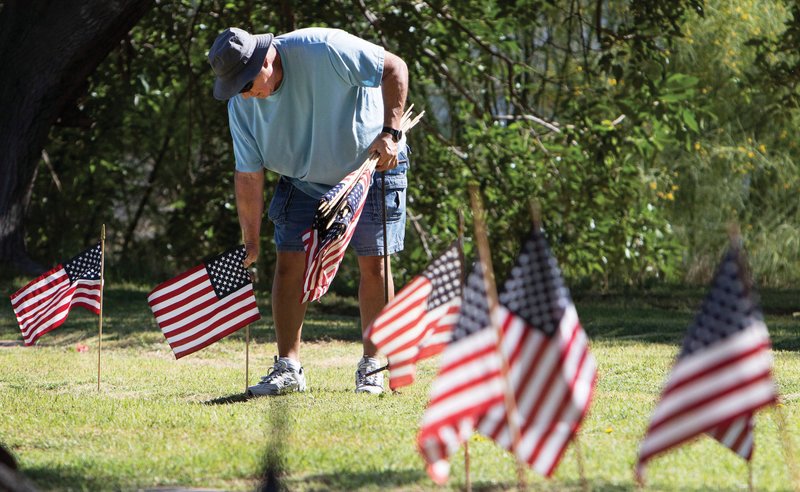The coronavirus pandemic has transformed nearly every facet of daily life. Now that includes Memorial Day events and traditions, as social distancing, closures and restrictions have disrupted the rituals of grief for those who have died in uniform.
Public events, such as wreath-laying ceremonies at national cemeteries, have either been altered or roped off from the public.
But the virus has also made quieter rituals of grief challenging or impossible.
For Richard Allen Smith and two Army veteran friends who served together in Afghanistan, an annual pilgrimage to Arlington National Cemetery is part of a new tradition. At least one of them, coming from Maryland and northern Virginia, has made the trip in the past six years or so to visit comrades killed in action.
[CORONAVIRUS: Click here for our complete coverage » arkansasonline.com/coronavirus]
They include Sgt. Charles E. Wyckoff Jr. On June 6, 2007, Smith's task on base was to help coordinate surveillance drones for soldiers in enemy contact. Wyckoff's patrol was attacked in Helmand province, and as he killed two Taliban militants in defense of his soldiers, Wyckoff was shot dead.
Smith still wonders if he could have done more.
"It's a more intense moment of grief when we're there for that," he said of the visit to Arlington.
But such visits are barred this year. The cemetery will be closed to visitors over the weekend; only family members of the interred may enter if they present passes and masks.
Others have adapted events to suit the coronavirus age.
Roman Baca, a former Marine Corps reservist, trained as a ballet dancer before he shouldered a machine gun in the Iraqi city of Fallujah in 2005. He then found a way to combine those two disparate worlds.
He co-founded a group in New York that depicts the experiences of war and trauma through dance. His company had never performed in his native New Mexico, and a scheduled visit this week was going to be the moment his vision reached new heights.
"I see the time blocked off on my calendar for it, and I get kind of depressed," Baca told The Washington Post.
Baca's now canceled trip was organized through his dance company. The group planned a weeklong trip to New Mexico, including a stop Albuquerque, his hometown, to hold dance workshops with local veterans and teach steps to disadvantaged kids.
Instead, Baca will hold a remote workshop for veterans in the United Kingdom. It will enable them to express their experiences through creative arts and learn new skills to help them find jobs in the field, Baca said.
The Tragedy Assistance Program for Survivors, a group that provides resources and care for those who have lost spouses and family members in uniform, has shifted its annual conference in Virginia to Zoom. That has allowed grieving families to find comfort among others even in a time of social isolation, founder Bonnie Carroll said.
Carroll also recognized similar feelings of grief among survivors of those who died of infections -- a sense of isolation and the burden of not saying goodbye, she said, that military families have historically experienced. The group stepped in to offer resources, including a mourner's bill of rights to help covid-ravaged families navigate their loss.
Others have not allowed restrictions to impede their holiday observations. Josh Holubz, an Army veteran who was wounded in Iraq, lives a couple hours from the White County, Ga., gravesite of Sgt. Jason Harkins, who was killed alongside five other soldiers and a Russian photojournalist in an IED improvised explosive device blast in 2007.
Holubz said he will avoid the holiday crowds but next week will leave moonshine at his friend's headstone and visit Harkins's family, who live nearby.
"You can't live in fear," Holubz said. "I think we learned that better than anybody."
A Section on 05/24/2020
